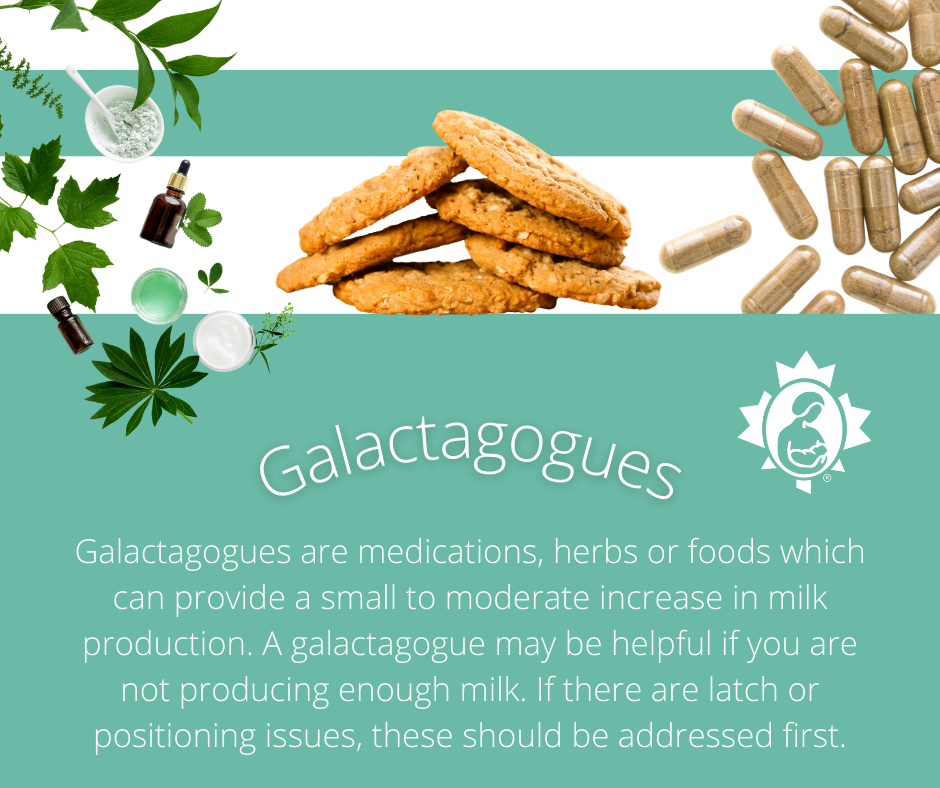
Galactagogues are medications, herbs or foods which can provide a small to moderate increase in milk production. A galactagogue may be helpful if you are not producing enough milk. A good, deep latch and effective milk removal from the start usually ensures a full milk supply without any need for galactagogues. If there are latch or positioning issues, these should be addressed first. See Positioning and Latching.
However if your baby is not gaining well even though he is latching well and you are nursing frequently, a galactagogue might be helpful. See Low Milk Production. If you are considering using a pharmaceutical or herbal galactagogue, consult with your healthcare professional.
Foods considered to be Galactagogues
Every culture has foods that have been traditionally used to increase milk production. There is no strong scientific evidence for any of these foods. However good nutrition will make you feel better and support milk production. Consider adding these foods that you enjoy eating to your diet. Some of the common foods which are considered galactagogues are:
- Oatmeal
- Dark, leafy greens (alfalfa, kale, spinach, broccoli)
- Fennel
- Garlic
- Chickpeas
- Nuts and seeds, especially almonds
- Ginger
- Papaya
- Spices like anise seeds, caraway, coriander, cumin seeds, dill, fennel seeds, fenugreek, turmeric
Herbal Galactagogues
Herbs and plant-based galactagogues have been used in many cultures throughout history. However, there has been little scientific research about the effectiveness of these plants on milk production. The doses of different herbal preparations are not standardized. Herbs can be as powerful as manufactured drugs. They can also have serious side effects. That said, many mothers have safely used herbs to increase their milk production. Discuss any new medication or herb with your health care professional before starting it. La Leche League Canada Leaders can provide you with information that you can share with your healthcare provider.
Some of the most commonly used herbal galactagogues are: fenugreek, blessed thistle, fennel, alfalfa, stinging nettle, goat’s rue, milk thistle, and moringa. Herbal galactagogues can be consumed as teas, powders, or capsules or as foods.
Pharmaceutical Galactagogues
Domperidone (Motilium™) is a prescription drug used to treat gastrointestinal issues such as nausea and reflux. A side effect of this drug is to increase milk production by boosting the prolactin level in nursing women. Some healthcare providers choose to prescribe this drug for a low supply. This is an “off-label” (not approved) use. Health Canada has not authorized this medication for increasing a low milk supply. The drug manufacturer is not responsible for negative side effects that occur as a result of ‘off-label’ use.
Domperidone is considered safe for a breastfeeding baby, because very little of the drug passes into the milk. However, Health Canada has concerns about possible risks for the mother.
If you are considering taking domperidone, discuss the following with your healthcare provider.
- Possible negative side effects such as dry mouth, headaches, dizziness, abdominal cramps, shortness of breath, rapid heart beat, chest pain.
- If an electrocardiogram (ECG or EKG) is needed to confirm your heart health.
- Interactions with other drugs. Domperidone inhibits the hormone dopamine and can interact with some medications, like anti-anxiety medications, which increase dopamine.
- Interactions with foods such as grapefruit and grapefruit extract.
- How to know if it’s working. Domperidone usually begins to work within 48 hours. If you do not notice any difference within one week, it is likely not working to increase your milk supply. Domperidone usually reaches peak level of effectiveness between two and four weeks.
- The importance of reducing the dosage very slowly when you are ready to stop taking it. Stopping this drug too quickly may result in serious negative side effects such as insomnia, heart palpitations, anxiety and depression. If you experience any of these symptoms, contact your healthcare provider.
Metoclopramide (Maxeran™, Reglan™) is also known to increase milk production, but it has frequent side effects which have made its use for nursing mothers unacceptable. These include fatigue, irritability, depression, tardive dyskinesia (involuntary repetitive body movements), oculogyric crisis (spasmodic movement of the eyeball). This is rarely prescribed in Canada to increase milk production.
If you have questions about your milk supply, or other breastfeeding challenges, please contact your local La Leche League Canada Leader. LLL Leaders can also share additional information about galactagogues.
References
Academy of Breastfeeding Medicine: ABM Clinical Protocol #9: Use of Galactogogues in Initiating or Augmenting Maternal Milk Production, Second Revision 2018.
Health Canada. (Updated 2022). New Health Product Safety Information: Domperidone and serious ventricular arrhythmias, QT interval prolongation and sudden cardiac death.
Mohrbacher, Nancy. (2020). Breastfeeding Answers: A Guide for Helping Families, Second Edition. Nancy Mohrbacher Solutions, Inc., 449-456.
National Library of Medicine. (2022, September 19). Domperidone. Drugs and Lactation Database (Lactmed).
National Library of Medicine. (2022, September 19). Metoclopramide. Drugs and Lactation Database (Lactmed).
Updated 2024
